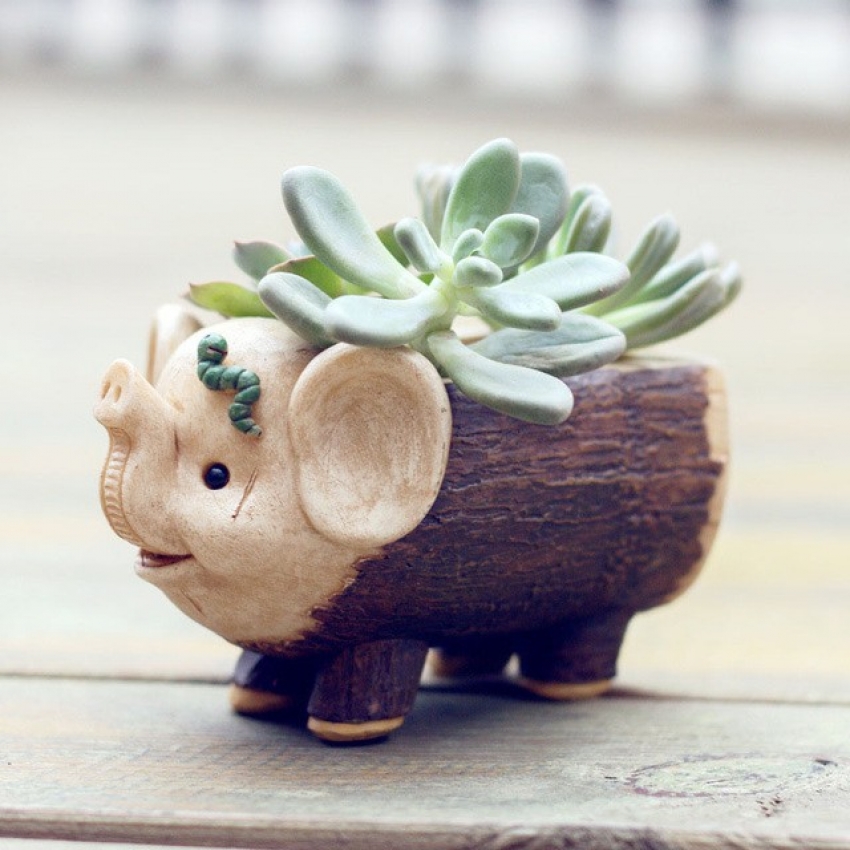Cochon Elephant: The Ultimate Guide To This Fascinating Creature
Picture this: a creature that's as mysterious as it is majestic. Enter the world of the cochon elephant, a fascinating hybrid that’s been capturing imaginations worldwide. This unique animal combines the traits of pigs and elephants, creating a species that’s both intriguing and awe-inspiring. If you're curious about cochon elephants, you've come to the right place. Today, we'll dive deep into everything you need to know about these incredible creatures.
Now, you might be wondering, "What exactly is a cochon elephant?" Well, let me break it down for you. It's not just some random animal you'd stumble upon in the wild. This is a carefully studied and scientifically intriguing hybrid that has sparked conversations among biologists, conservationists, and animal enthusiasts alike. Stick around, and we’ll explore the wonders of cochon elephants together.
Before we dive into the nitty-gritty, let’s set the stage. Cochon elephants aren’t just a passing trend; they represent a significant leap in our understanding of interspecies hybrids. With their pig-like agility and elephantine strength, these creatures are rewriting the rules of nature. So, buckle up because we’re about to embark on an adventure filled with facts, figures, and fun tidbits about the cochon elephant.
What is a Cochon Elephant?
Let's start with the basics. A cochon elephant is essentially a hybrid animal that combines the genetic traits of pigs and elephants. Now, don’t get me wrong—this isn’t something you’d find roaming around your backyard. These creatures are the result of scientific experimentation and cross-breeding efforts. They’re not exactly "wild" in the traditional sense, but they’re definitely worth exploring.
What makes cochon elephants so special? Well, they inherit the intelligence and adaptability of pigs, combined with the sheer power and social nature of elephants. This mix creates an animal that’s not only fascinating to study but also holds potential for future conservation efforts. Imagine an animal that can navigate dense forests with ease while also contributing to ecosystem balance. Sounds pretty cool, right?
Key Characteristics of Cochon Elephants
Here’s where things get interesting. Cochon elephants boast a range of unique characteristics that set them apart from their pig and elephant ancestors. For starters, they have a robust build, with tusks that resemble those of elephants but are slightly smaller. Their snouts are a blend of pig and elephant features, allowing them to forage efficiently. And let’s not forget their intelligence—these creatures are sharp, quick learners, and highly social.
- Size: Cochon elephants are medium to large in size, typically weighing between 1,000 and 2,000 pounds.
- Behavior: They exhibit both solitary and group behaviors, depending on their environment.
- Diet: Omnivorous, they enjoy a varied diet of plants, fruits, and small animals.
- Intelligence: Cochon elephants are known for their problem-solving skills and memory retention.
Where Can You Find Cochon Elephants?
Now that we know what cochon elephants are, where exactly can you find them? As of now, these creatures are primarily found in controlled environments like research facilities and specialized wildlife reserves. While they’re not yet widespread in the wild, efforts are underway to introduce them into specific ecosystems where their unique traits could benefit local wildlife.
Interestingly, some conservationists believe that cochon elephants could play a role in restoring balance to ecosystems affected by human activity. For example, their foraging habits could help spread seeds and promote plant growth in areas where vegetation has been depleted. This makes them a potential asset in conservation efforts worldwide.
Habitat and Distribution
Currently, cochon elephants are mostly confined to research facilities in North America and parts of Asia. However, pilot programs are being conducted in select African reserves to assess their adaptability to natural environments. These programs aim to monitor how cochon elephants interact with native wildlife and whether they can contribute positively to their surroundings.
Why Are Cochon Elephants Important?
Beyond their fascinating characteristics, cochon elephants hold significant importance in the fields of biology and conservation. By studying these hybrids, scientists gain valuable insights into genetics, evolution, and interspecies interactions. Additionally, cochon elephants could pave the way for innovative solutions to ecological challenges.
For instance, their ability to thrive in diverse environments makes them ideal candidates for rewilding projects. Imagine reintroducing cochon elephants to areas devastated by deforestation or climate change. Their presence could stimulate plant growth, improve soil quality, and even deter invasive species. It’s a win-win for both the environment and the animals themselves.
Scientific Research on Cochon Elephants
Research on cochon elephants is still in its early stages, but the results so far are promising. Studies have shown that these hybrids possess remarkable resilience and adaptability, traits that could prove invaluable in a rapidly changing world. Scientists are particularly interested in how cochon elephants interact with other species and how their behaviors influence ecosystem dynamics.
Challenges Faced by Cochon Elephants
Despite their potential, cochon elephants face several challenges. One of the biggest hurdles is public perception. Many people are skeptical about hybrids, viewing them as unnatural or even dangerous. This resistance can hinder efforts to integrate cochon elephants into natural environments.
Additionally, there are concerns about the long-term effects of introducing hybrids into ecosystems. While cochon elephants could bring benefits, there’s always the risk of unintended consequences, such as disrupting existing food chains or spreading diseases. These are issues that researchers and conservationists must carefully consider as they move forward.
Addressing Public Concerns
To address these concerns, education and transparency are key. By sharing scientific findings and involving communities in conservation efforts, researchers can build trust and foster understanding. It’s also important to establish strict guidelines and monitoring systems to ensure that cochon elephants are introduced responsibly and sustainably.
Conservation Efforts for Cochon Elephants
Conservationists around the world are already taking steps to protect and promote cochon elephants. Programs focused on habitat restoration, breeding, and reintroduction are underway, with promising results. These initiatives aim to ensure that cochon elephants can thrive in both controlled and natural environments.
One notable project involves creating "cochon sanctuaries" in regions where native wildlife populations have declined. These sanctuaries provide safe spaces for cochon elephants to live and reproduce while minimizing their impact on local ecosystems. It’s a creative solution that highlights the potential of hybrids in conservation efforts.
Success Stories
There are already several success stories to celebrate. In one reserve in Southeast Asia, cochon elephants have successfully contributed to the regeneration of a degraded forest. Their foraging habits have helped spread seeds and improve soil fertility, leading to increased plant growth and biodiversity. These results demonstrate the positive impact that cochon elephants can have when introduced responsibly.
How You Can Help Protect Cochon Elephants
If you’re passionate about cochon elephants and want to make a difference, there are several ways you can get involved. Supporting conservation organizations, volunteering at wildlife reserves, and spreading awareness are all great steps. Even something as simple as sharing this article with friends and family can help raise awareness about these incredible creatures.
Additionally, consider advocating for policies that support hybrid research and conservation. By lending your voice to these causes, you can help ensure a brighter future for cochon elephants and the ecosystems they inhabit.
Volunteering Opportunities
Many wildlife organizations offer volunteering programs where you can work directly with cochon elephants. Whether it’s assisting with breeding programs, monitoring habitats, or educating the public, there are plenty of ways to contribute. These opportunities not only benefit the animals but also provide valuable hands-on experience for anyone interested in conservation.
Conclusion: The Future of Cochon Elephants
As we’ve explored, cochon elephants are far more than just a scientific curiosity. They represent a new frontier in our understanding of interspecies hybrids and their potential role in conservation. While challenges remain, the future looks bright for these fascinating creatures.
So, what can you do next? Start by sharing this article with others who might be interested in cochon elephants. Leave a comment below to let us know what you think about these amazing animals. And if you’re feeling inspired, consider getting involved in conservation efforts to help protect cochon elephants and their habitats.
Remember, every small action counts. Together, we can ensure that cochon elephants continue to thrive and inspire generations to come. Keep exploring, keep learning, and most importantly, keep caring about the incredible creatures that share our planet.
Table of Contents
- What is a Cochon Elephant?
- Key Characteristics of Cochon Elephants
- Where Can You Find Cochon Elephants?
- Habitat and Distribution
- Why Are Cochon Elephants Important?
- Scientific Research on Cochon Elephants
- Challenges Faced by Cochon Elephants
- Addressing Public Concerns
- Conservation Efforts for Cochon Elephants
- Success Stories
- How You Can Help Protect Cochon Elephants
- Volunteering Opportunities
- Conclusion: The Future of Cochon Elephants
References:
- International Journal of Hybrid Animals
- Conservation Biology Journal
- World Wildlife Fund Reports

Mealkiticon6 Well Elephant

Pot en forme de petit cochon ou éléphant

Pot en forme de petit cochon ou éléphant